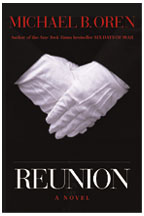October 22, 2003: Reading Room
 War
stories
War
stories
Scholar Michael Oren *86 uses his father’s experiences as basis for
new novel
By Louis Jacobson ’92
PHOTO: A historian of the Middle East, Michael Oren *86 also wrote Six Days of War, an account of the pivotal war in 1967. (MacAdam/Cage)
As a scholar and writer, Michael Oren *86 has focused intensively on his adopted country, Israel. His most widely read book, Six Days of War: June 1967 and the Making of the Modern Middle East (2002), was praised by reviewers as the first comprehensive study of the landmark war. Oren, who moved to Israel after earning a doctorate in Near Eastern studies from Princeton, watched the 1967 war unfold as a youngster growing up in New York and New Jersey. He was alarmed by the attacks by Arab nations, and then felt pride as Israel triumphed and seized new territory. But his subsequent experience as a paratrooper in the Israeli army added complexity to his understanding of that and other wars. The unit he served with in Lebanon was decimated by casualties, says Oren, a senior fellow at the Shalem Center, a think tank based in Jerusalem.
 In his
first novel, Reunion, published this year by MacAdam/Cage, Oren
addresses war and memory — but in this case, it is his father’s.
The novel is based “about 95 percent” on actual events that
Oren gleaned from his father’s reunions with fellow World War II
G.I.s. In 1944, 19-year-old Lester M. Bornstein, Oren’s father, fought
with the U.S. Army’s 168th Battalion at the Battle of the Bulge,
helping hold — despite great losses — a ridge for six days against
a fierce Nazi offensive. Years later, Bornstein was so assiduous about
telling his son stories of his unit’s combat that Oren came to know
the stories almost as well as his father did. Talking about his experiences,
Oren believes, helped his father come to terms with what he had experienced.
In his
first novel, Reunion, published this year by MacAdam/Cage, Oren
addresses war and memory — but in this case, it is his father’s.
The novel is based “about 95 percent” on actual events that
Oren gleaned from his father’s reunions with fellow World War II
G.I.s. In 1944, 19-year-old Lester M. Bornstein, Oren’s father, fought
with the U.S. Army’s 168th Battalion at the Battle of the Bulge,
helping hold — despite great losses — a ridge for six days against
a fierce Nazi offensive. Years later, Bornstein was so assiduous about
telling his son stories of his unit’s combat that Oren came to know
the stories almost as well as his father did. Talking about his experiences,
Oren believes, helped his father come to terms with what he had experienced.
Oren, who hebraized his name, retells his father’s stories in Reunion, using as his conceit the fictionalized reunion of former American servicemen in the village of St. Vith in Belgium’s Ardennes forest, 55 years after the fighting ended. In the novel the veterans, like Oren’s father, had fought the Nazis, holding a ridge outside the village for six days. The reunion is partially about the aftermath of war — injuries sustained, post-traumatic stress endured, familial relationships altered, but it is also about grappling with unresolved mysteries and conflicts — bodies never located, commanders detested by grunts. “It shows how the men come to grips with their war experiences and with the disparate courses of their lives,” says Oren. “Old grievances are, in the end, resolved, and old secrets revealed. The men can continue with the rest of their lives in companionship and even a measure of peace.”
Ironically, Oren says he doesn’t like discussing the realities
of combat with his own children, saying it’s too painful. Oren’s
oldest son serves as a commando with the Israeli military. “I don’t
sleep at night because I don’t know what’s going to happen to
him,” says Oren, a former aide to the late prime minister Yitzhak
Rabin. “And my other two kids take municipal buses to school, so
they’re at least as much targets for terrorists as my older son.
There used to be a distinction between going off to war and staying home,
but it’s not like that anymore.”
![]()
Louis Jacobson ’92 is a staff correspondent at National Journal magazine.
BOOK SHORTS
By Jeanne Alnot ’04
 Southern Excursions:
Views on Southern Letters in My Time — George Garrett ’52
*85, edited by James Conrad McKinley (Louisiana). This compilation is
a tribute to Garrett as writer, editor, academic, and critic. Collected
here are more than 50 of his best interviews, essays, and reviews about
Southern literature and authors. Garrett is a professor of creative writing,
emeritus, at the University of Virginia. McKinley is a former student
of Garrett’s.
Southern Excursions:
Views on Southern Letters in My Time — George Garrett ’52
*85, edited by James Conrad McKinley (Louisiana). This compilation is
a tribute to Garrett as writer, editor, academic, and critic. Collected
here are more than 50 of his best interviews, essays, and reviews about
Southern literature and authors. Garrett is a professor of creative writing,
emeritus, at the University of Virginia. McKinley is a former student
of Garrett’s.
 Kate Remembered —
A. Scott Berg ’71 (Putnam). Both biography and memoir, this book
is told by the man Katharine Hepburn chose as her chronicler and who became
her close friend during the last two decades of her life. Kate Remembered
revisits Hepburn’s career as an actress and as an icon for the American
woman, and includes details about her relationships with Spencer Tracy
and Howard Hughes. Berg won the Pulitzer Prize for his biography Lindbergh
(1998).
Kate Remembered —
A. Scott Berg ’71 (Putnam). Both biography and memoir, this book
is told by the man Katharine Hepburn chose as her chronicler and who became
her close friend during the last two decades of her life. Kate Remembered
revisits Hepburn’s career as an actress and as an icon for the American
woman, and includes details about her relationships with Spencer Tracy
and Howard Hughes. Berg won the Pulitzer Prize for his biography Lindbergh
(1998).
 Weapons of Mass
Deception: The Uses of Propaganda in Bush’s War on Iraq —
Sheldon Rampton ’82 and John Stauber (Penguin). The authors analyze
the public relations campaign waged by the Bush administration to sell
Operation Iraqi Freedom to the American people. The book discusses the
“big lie” tactic — repetition and misinformation —
and includes a section on how other countries perceive the U.S. Rampton
and Stauber write and edit PR Watch: Public Interest Reporting on the
PR/Public Affairs Industry.
Weapons of Mass
Deception: The Uses of Propaganda in Bush’s War on Iraq —
Sheldon Rampton ’82 and John Stauber (Penguin). The authors analyze
the public relations campaign waged by the Bush administration to sell
Operation Iraqi Freedom to the American people. The book discusses the
“big lie” tactic — repetition and misinformation —
and includes a section on how other countries perceive the U.S. Rampton
and Stauber write and edit PR Watch: Public Interest Reporting on the
PR/Public Affairs Industry.
